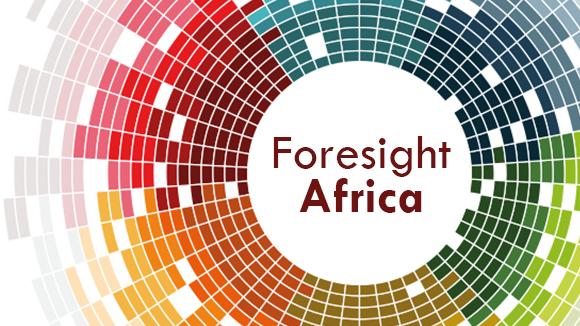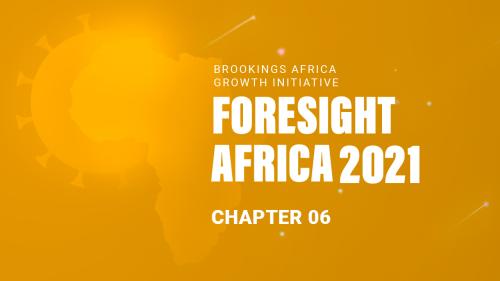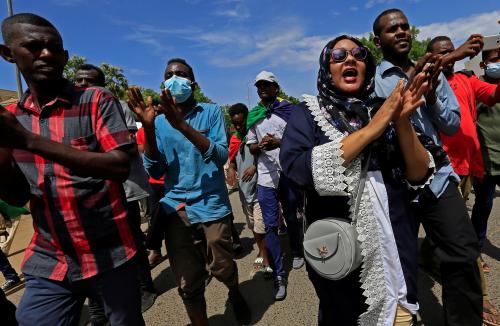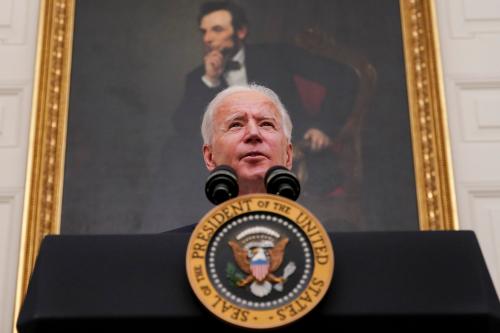Below is a Viewpoint from Chapter 6 of the Foresight Africa 2021 report, which explores top priorities for the region in the coming year. This year’s issue focuses on strategies for Africa to confront the twin health and economic crises created by the COVID-19 pandemic and emerge stronger than ever. Read the full chapter on good governance.
 While African countries faced many challenges in 2020, the year 2021 is creating many opportunities for them to significantly improve their governance systems. For one thing, COVID-19 has forced many policymakers and civil society leaders to recognize the importance of technology to political and economic participation. For example, video conferencing platforms—now ubiquitous due to their use in minimizing the spread of the virus—have enabled governments, firms, and civil society organizations to conduct business virtually, creating the space to improve participation in governance generally and in elections in particular. Such a process augurs very well for inclusiveness and the entrenchment of democracy. So, in 2021, African governments should invest in the necessary infrastructure to significantly improve access to these participation-enhancing technologies.
While African countries faced many challenges in 2020, the year 2021 is creating many opportunities for them to significantly improve their governance systems. For one thing, COVID-19 has forced many policymakers and civil society leaders to recognize the importance of technology to political and economic participation. For example, video conferencing platforms—now ubiquitous due to their use in minimizing the spread of the virus—have enabled governments, firms, and civil society organizations to conduct business virtually, creating the space to improve participation in governance generally and in elections in particular. Such a process augurs very well for inclusiveness and the entrenchment of democracy. So, in 2021, African governments should invest in the necessary infrastructure to significantly improve access to these participation-enhancing technologies.
An important challenge that Africans face as they seek to create a democratic tradition is that many citizens are not aware of their national constitution, nor understand the role that the provisions of the constitution plays in the regulation of their relationship with their governments, as well as with their fellow citizens. For good governance to be truly entrenched, the majority of citizens must understand their constitution and see the law as a tool for protecting their rights and enabling other activities (e.g., entrepreneurship to create wealth) to improve their lives. Thus, in 2021, African governments should begin nationwide civic education programs in languages that their citizens can understand in order to help them internalize these complex and important relationships. Such steps can bolster the civic engagement that is already on the rise. Indeed, 2020 saw an eruption of peaceful protests throughout many African countries as citizens demanded an end to police brutality and impunity by state- and non-state actors. (For example, in Nigeria, protestors stood up against extrajudicial killings by the police and other security forces; in Cameroon, against the killing of civilians by government security forces in the country’s Anglophone North West Region; in Egypt against what protesters claimed was continued government repression; in South Sudan against brutality by soldiers; and in Kenya against police brutality. For a visual on the spread of protests in Nigeria, see Figure 6.6).
Although the pandemic has complicated the election process, many countries have been able to hold elections and must continue to do so. Unfortunately, the possibility of post-election violence continues to diminish the critical role played by elections in institutionalizing and entrenching democracy. Thus, in 2021, African countries must redouble their efforts to minimize political interference in the judiciary, ensuring that their judicial systems are both independent and robust enough to peacefully adjudicate such conflicts. As evidence from Ghana and Kenya shows, if court rulings are based on the application of the facts to the law, citizens are likely to accept those decisions and resist the temptation to engage in violent mobilization.
Importantly, elections—of which 15 national-level are scheduled in 2021—can help Africans build and sustain effective democratic institutions, but they cannot be undertaken in institutional environments that are pervaded with extrajudicial killings and other forms of government impunity. Hence, this year, African countries must work hard to make certain that their governing processes provide citizens with the tools (e.g., an independent judiciary; a free press; free, fair, transparent, inclusive, and credible elections) to effectively guard the exercise of government power and force governments to be accountable to the people and the constitution.
In recent years, many authoritarian governments in Africa have manipulated elections to remain in power indefinitely. They have done so by first, changing their constitutions to eliminate term limits for the president and, second, by rigging national elections and making it difficult for the opposition to participate. In 2021, many African countries will have to revisit the process of amending their national constitutions and provide themselves with one that cannot be easily manipulated by opportunistic political elites. (For more on the attempts to eliminate term limits
on the continent, see Figure 6.5). While it is necessary to strike a balance between rigidity and flexibility, the process must be robust enough to prevent individuals and special interest groups from engaging in opportunistic constitutional changes.
The new Biden/Harris administration, which came into power in January 2021 in the United States, has already indicated its interest in leading the struggle for good and inclusive governance and the rule of law around the world. Thus, 2021 offers opportunities for civil society organizations in African countries to engage their national governments—hopefully with the help of Washington and other like-minded global players—to improve governance generally and the recognition and protection of human rights in particular.
Thus, as African economies seek ways to restructure themselves after COVID-19, now is the time for many governments that have drifted away from their founding principles of good governance and democracy to return to the path of constitutionalism and the rule of law.
The Brookings Institution is committed to quality, independence, and impact.
We are supported by a diverse array of funders. In line with our values and policies, each Brookings publication represents the sole views of its author(s).











Commentary
Entrenching democracy in African countries: Policy imperatives for leaders in 2021
March 18, 2021